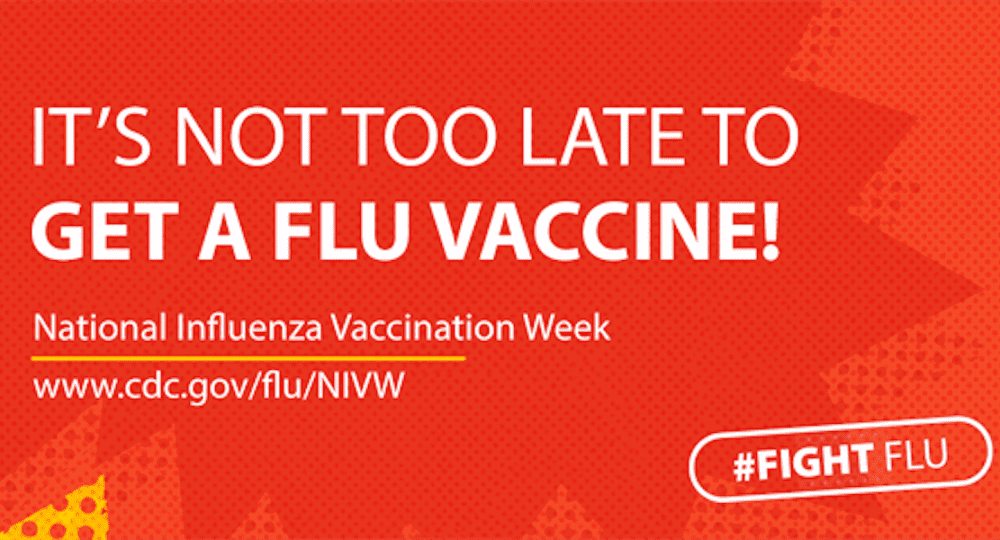CDC Recommendations for Influenza Vaccinations and the Establishment of “National Influenza Vaccination Week in 2005”:
According to the CDC, the flu vaccine continues to be the critical factor in preventing flu-related illnesses. Everyone 6 months of age and older should receive an influenza vaccination every year by the end of October. In addition, the CDC recommends that flu vaccinations should continue to be administered throughout the flu season since past seasons have been known to remain active well into the month of May.
Unfortunately, the CDC reports that vaccination rates historically decline following the month of November each year. This trend is of concern in light of the long duration of previous flu season activity. In response to this decline in vaccination rates, the CDC established “National Influenza Vaccination Week” to re-introduce the importance of ongoing flu prevention measures- specifically “late” flu vaccinations.
Just the basics: What is the “Flu”?
According to the CDC: “Influenza (flu) is a contagious respiratory illness caused by influenza viruses. It can result in mild to severe illness. Significant complications can result in hospitalization or death”. Flu Symptoms include:
- Fever /chills and cough
- Sore throat
- Runny or stuffy nose
- Muscle or body aches
- Headaches Fatigue (tiredness)
- Some people may have vomiting and diarrhea, though this is more common in children than adults.
The impact of last year’s flu season in the United States (October 1, 2018, to May 4, 2019) is sobering:
- The CDC has released its preliminary estimates of last year’s season and the impact on the public as a result of flu-related illnesses. The previous season is described as a “moderate severity season with two waves of influenza A activity of similar magnitude”. In addition, last year’s active flu season lasted a whopping 21 weeks, making it the longest flu season in a decade. The CDC estimates that the impact of last year’s flu season has resulted in:
- 37.4 million–42.9 million symptomatic illnesses;
- 17.3 million–20.1 million medical visits;
- 531,000–647,000 hospitalizations;
- 36,400–61,200 deaths in the United States.
- For more information about “Flu Burden”, please visit: https://www.cdc.gov/flu/about/burden/faq.htm
The Flu Vaccine can prevent you from becoming sick due to the influenza virus and/or reduce the severity and duration of flu-related symptoms if the infection does occur following vaccination:
- The CDC estimates that the flu vaccine can reduce your risk of requiring a Doctor’s visit by 40-60% depending on the season and the “match” between the vaccination and the predominant flu strains for any given year.
- Vaccination reduces the incidence of hospitalization and death as a result of developing moderate/severe flu-related complications. Serious complications can result from the influenza virus infection alone or from a combination of the virus and superimposed bacterial infection. Some of the more serious complications can include: Viral and/or bacterial pneumonia, encephalitis, severe sepsis, septic shock, and even death. For more information about high-risk populations and potential complications, please visit: https://www.cdc.gov/flu/symptoms/symptoms.htm
The Flu Vaccine can prevent the transmission of the virus to at-risk/high-risk populations such as:
- Adults 65 years and older
- Children younger than 2 years old
- Pregnant women and women up to 2 weeks after the end of pregnancy
- American Indians and Alaska Natives
- People who live in nursing homes and other long-term care facilities
- Children younger than 6 months who are too young to get a flu vaccine.
- Although all children younger than 5 years old are considered at high risk for serious flu complications, the highest risk is for those younger than 2 years old, with the highest hospitalization and death rates among infants younger than 6 months old.
- For more information about who is considered “At Risk”, please visit: https://www.cdc.gov/flu/highrisk/index.htm
- Although all children younger than 5 years old are considered at high risk for serious flu complications, the highest risk is for those younger than 2 years old, with the highest hospitalization and death rates among infants younger than 6 months old.
It is not too late to “Fight the Flu” this season by getting your flu vaccine and encouraging others to protect themselves and their loved ones by doing the same. Join the conversation on social media with the hashtag #FightFlu.
Do you want to know more? Please visit the following link:
Learn more about what’s new for the 2019-2020 flu season.





